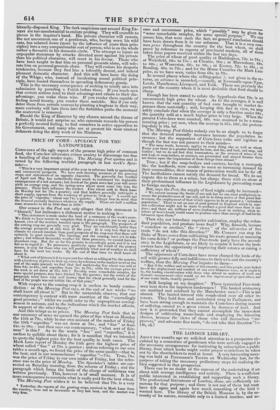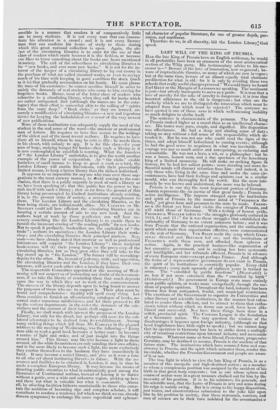THE LONDON LIBRARY.
Ancoar two months ago we solicited attention to a prospectus cir- culated by a committee of gentlemen who were actively engaged in the necessary arrangements for instituting by subscription a public library, from which books might under proper restrictions be taken out by the shareholders to read at home. A very interesting meet- ing was held at Freemason's Tavern on Wednesday lust, for the purpose of taking the necessary preliminary steps for realizing the idea suggested in that prospectus.
There can be no doubt of the success of the undertaking, if set about with average intelligence and activity. There is a sufficient public interested in establishing and supporting such a library. The professional litterateurs of London, alone, are sufficiently nu- merous for that purpose ; and there is not one of them but must have felt again and again how much something of the kind is wanted here. The library of the British Museum is, by the ne- cessity of its nature, accessible only to a limited number, and ac-
cessible in a manner that renders it. of comparatively little use to many students. It is not every man that can concen- trate his attention in a crowd ; and it is not every literary man that can conform his hours of study to those during which this great national collection is open. Again, the ob- ject of the circulating libraries is to cater for the use of that class of readers which reads because it is the fashion, or because one likes to know something about the books one bears mentioned in society. The call of the subscribers to circulating libraries is for " new books, and ever more new books." It is not for the in- terest of the keeper of a circulating library to lay out money in the purchase of what are called standard works, or even to occupy much of his time with keeping in good condition the stock (such as it is) that gradually accumulates on his hands. Ile must please the mass of his customers : he cannot sacrifice himself in order to satisfy the demands of real students who come to him craving, for forgotten books. Hence, most of the latter class of readers who subscribe to a circulating library, when they call fbr books which are rather antiquated, find (although the names are in the cata- logue) that their• effort is somewhat akin to the calling of " spirits
from the vasty deep." " Book clubs," as they are termed, are merely a modification of circulating libraries—a new and ingenious device for keeping the lackadaisical au courant of the very newest of new publications. None of these institutions can adequately supply the need of the student in the real sense of the word—the amateur or professional man of letters. Ile requires to have free access to the writings of the oldest and of the most recent authors. He requires to have them all to himself, where he may be tolls in illis : he needs them in his closet, with nobody to spy. It is for this class—for your men of huge, undying hunger for books—that such a library as it is now contemplated to establish is wanting. What the founders of " the London Library" undertake, is to give the world another example of the power of cobperation. As " the clubs'' enable bachelors of small income to keep as good a cook as a lord, the London Library will enable littCirateurs, with their proverbially limited means, to keep a better library than the richest individual.
It appears to us impossible for any one who runs over these sug- gestions in the most cursory manner, to avoid coming to the con- clusion, that there is a public urgently in need of such a library as we have been speaking of; that this public has the power to fur- nish itself with such a library ; that so far from the ground of this library being preoccupied by kindred institutions already existing, it is, in the present state of society, a necessary complement to them. The London Library and the circulating libraries, so far from being rivals, are indispensable allies. Mr. Coanenx or Mr. BENTLEY could tell how efficient the circulating libraries are in insuring a certain amount of sale to any new book. And the authors kept at work by those gentlemen can tell how ne- cessary something like the London Library is to enable them to furnish the incessant craving of "the reading public" for new books. Not to speak it profusely, booksellers are the capitalists of " the trade " ; authors its operatives ; the London Library their work- shop ; and the circulating libraries their principal markets. Nay, more—we have already stated that amateur as well as professional litt6rateurs will support " the London Library": these incipient book-worms will try their young flings on the green crop of the circulating libraries, but as they grow older they will take to the hay stored up in "the London." The former will be recruiting- depots for the other. So, instead of jealousy, strife, and opposition, the circulating libraries and the London, if they know their own interests, will assist each other after a brotherly thshion.
The respectable Committee appointed at the meeting of Wed- nesday will not suspect us of insinuating any doubt of their earnest- ness, if we take the liberty of reminding them that much depends upon the way in which they set to work at the commencement. The success of the library depends upon its being found to answer the purposes of those who are to support it. Their plan must be broad and comprehensive : timidity will spoil every thing. Let theta combine to furnish an all-embracing catalogue of books, as- sorted under numerous subdivisions ; and let them proceed to fill np the various departments in the order the demands of the sub- scribers and the amount of their funds shall suggest.
Finally, we shall watch with interest the progress of the London Library, not only for the direct, but perhaps still more for the col-
lateral advantages to be derived from its establishment. Among many striking things which tell from Mm'. CARLYLE in the piquant address to the meeting of Wednesday, was the following—" Every man able to read a good book becomes a better man : he becomes a centre of' light and order, and of just insight into the things around bins" This library may likewise become a light to those around, all the while its members are only minding their own affairs; and is the more likely to become such a light, the more exclusively they confine themselves to the business they have immediately in hand, It may become a model library, and give as it were a tone to all who set about instituting libraries in future. With the re- sources and limilities to be obtained in London, it may in time be made a complete European library. It may become the means of directing public attention to what is substantially good among the literatures of Continental nations, instead of leaving it to flutter without a guide, over a wide and unknown region, picking up here and there not what is valuable but what is comeataide. Above all, by affording facilities hitherto unattainable to those who enter- tain the ambition of becoming ripe and complete scholars, it will contribute to confirm a tendency (of which we think we can already discern symptoms) to exchange the more superficial and epheme- ral character of popular literature, for one of greater depth, pre- cision, and manliness.
Therefore do we, in all sincerity, bid the London Library: God speed.



























 Previous page
Previous page